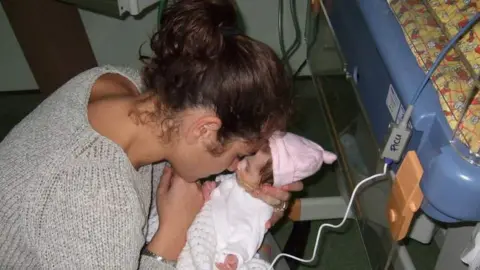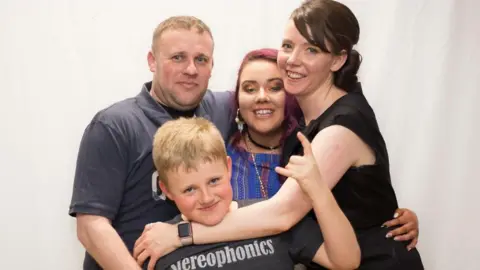Mitochondrial disease: Chepstow woman inspires charity
 Helen Ray
Helen RayA woman who died from a rare genetic disease aged 22 has helped inspire a leading charity to provide a young adult support service.
Tirion Ray was diagnosed with mitochondrial disease - a progressive condition which eventually leads to organ failure - in 2013, aged 18.
Tirion, who died at the Royal Gwent Hospital in February, spoke of her isolation as friends "drifted away".
The Lily Foundation said Tirion's experience has inspired a new project.
Liz Curtis, founder and CEO of the Lily Foundation, named after her daughter who died, aged just eight months, of mitochondrial disease, said Tirion was not alone in experiencing loneliness.
Her story helped inspire a peer-to-peer support network for young adults at the charity, she said.
 Liz Curtis
Liz Curtis"Some of my strongest memories of my daughter, Tirion, are of the love she had for nature," Tirion's mum Helen Ray, 44, a project manager from Chepstow, told BBC Wales.
"Her teenage years with us were joyful and fun, with friends popping over and long dog walks in the countryside. But on the cusp of adulthood - aged 18 - she fell ill."
 Helen Ray
Helen RayTirion, then working as an insurance clerk in Bristol, began suffering severe headaches and seizures.
But Mrs Ray said the family had no idea what was wrong and that the "confusion lasted even when she was diagnosed" with mitochondrial disease.
Despite the disease being brought to greater public attention by the Charlie Gard case, it is not a widely known condition.

What is mitochondrial disease?
- Is an inherited illness that can be present at birth or develop later in life, often in young adults
- The mitochondria are the engines of the body's cells and provide energy for all metabolic processes
- It causes debilitating physical, developmental, and cognitive disabilities
- Symptoms include loss of muscle coordination, seizures, vision loss, hearing loss and organ failure
- The disease is progressive and has no cure

Mrs Ray said the nearest specialist centre is in Newcastle, roughly five hours' drive away.
"We often felt so lonely and unsupported, I almost wished she had cancer just so we could access the many charities and support groups," she explained.
"I know cancer, too, is horrific but it is more widely known."
After the diagnosis, Mrs Ray and husband Steve, 43, took time off work to care for Tirion. She had five years with some "good spells" where she "could function relatively normally", Mrs Ray added.
But the seizures got worse and more frequent, and doctors needed to control them through very heavy medication.
You might also be interested in:
"Still, though, we didn't think she would die," Mrs Ray said. But in February this year, she deteriorated.
"She couldn't walk without help, and began hallucinating, suffering from a form of postictal psychosis, which often occurs after a cluster of seizures."
A month later, she was bed-bound in the Royal Gwent Hospital in Newport, repeatedly fighting off infections.
Mrs Ray added: "Although she was only 22, she was so brave, telling doctors she didn't want more medicine to prolong her life.
"She just wanted palliative care as she didn't want to live if she could do nothing for herself. Eventually, she got a chest infection and within a couple of weeks, had gone."
 Helen Ray
Helen RayFor Mrs Ray, the pain of losing her daughter has been unbearable.
"I feel like I have a huge gaping hole in my heart," she said. "The house is so quiet, and often I will say something to her, forgetting she's not there.
"I feel like I have lost part of my body. It is incredibly difficult getting through the day."
But one of Tirion's final observations could help young adults facing a similar ordeal.
"She apologised to her dad that he would never walk her down the aisle, then she told me she felt like she had deleted her profile from life - meaning she no longer felt part of it; many of her friends had drifted away during her illness," Mrs Ray explained.
Ms Curtis added: "After losing Tirion and a couple of others her age, in July we set up the young adult support service and we have a young adult weekend coming up.
"It is to help socialisation - mitochondrial disease literally strips everything away. It is heartbreaking to watch.
"Young adults lose all their friends, they can't go out and they can't do anything for themselves."
